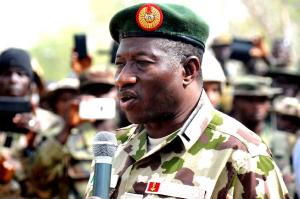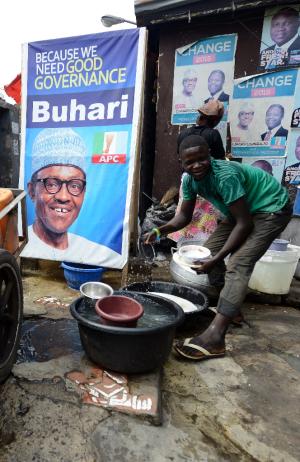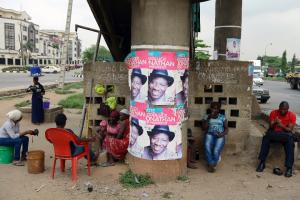Lagos (AFP) - The Nigerian Army and its allies have claimed a series of successes against Boko Haram, on the face of it handing President Goodluck Jonathan a trump card in upcoming elections.
But experts say the apparent territorial gains may not translate into votes at the ballot box on March 28, with the situation still uncertain on the ground and tensions between the militaries involved.
Jonathan has been seen in combat fatigues congratulating troops after the recapture of Baga in northern Borno while the military has widely publicised its claimed gains on social media.
He told Voice of America in an interview published on Wednesday that Yobe and Adamawa state would be rid of Boko Haram by next week, and Borno within three weeks.
Earlier in the day, his government said 36 towns had been recaptured since a military coalition involving Cameroon, Chad and Niger began a concerted regional fight-back last month.
Ordinarily, a leader should be able to make political capital out of the successes, but with Nigeria outgunned and out-manoeuvred for so long by Boko Haram, the situation is not so clear-cut.
View gallery

Handout picture by State House Photo on February 26, 2015, shows Nigerian President Goodluck Jonatha …
"A lot of this (the military campaign) is coming almost as too little, too late," political commentator Chris Ngwodo told AFP.
"People are willing to applaud the Nigerian Army for what it's doing but not willing to extend the applause to the president, the commander-in-chief.
"I don't think it (the military campaign) is going to have the sort of dramatic, knock-on effect in the campaign."
- Good publicity -
Nigerians had been due to vote on February 14, with Jonathan and his Peoples Democratic Party (PDP) facing an unprecedented challenge from Muhammadu Buhari's All Progressives Congress (APC).
View gallery

A roadside restaurant features on March 12, 2015, a poster of main opposition All Progressives Congr …
An Afrobarometer poll at the end of January put Jonathan and Buhari neck-and-neck on 42 percent, with the prospect that the PDP could lose the presidency for the first time since 1999.
Buhari, a former army general who headed a military government in the mid-1980s, has been seen as better placed to tackle Boko Haram, whose rebellion has killed more than 13,000 since 2009.
The military under Jonathan has been repeatedly criticised for failing to stop the violence, compounded by a series of previously misleading or untrue statements.
Thomas Hansen, from Control Risks consultants, described the military successes as "relatively credible" but with no independent verification, fears of propaganda persist.
For Imad Mesdoua, the military offensive has given a potential advantage to Jonathan and the PDP in terms of publicity.
View gallery

Workers sit beside campaign posters of Nigerian President and presidential candidate of ruling Peopl …
"It certainly works in his favour and his party's favour," said Mesdoua, a political analyst specialising in West Africa at the Africa Matters consultancy in London.
"The president and his camp can point to genuine successes... The narrative was very negative. That's kind of reversed entirely."
But Nigeria's military has still had to face down claims from Niger and in particular Chad that their troops have played a major role in the recapture of towns previously under rebel control.
Questions remain, too, about overall election security, with a recent rise in suicide attacks and bombings by Boko Haram, which last weekend pledged allegiance to the Islamic State group.
A longer term strategy once the military operation is over has yet to be outlined, including what happens to the presence of foreign troops on Nigerian soil.
- Voting intentions -
The controversial six-week extension to the election campaign was seen as favouring the PDP, allowing them to regain the momentum from the APC using the power of incumbency, including finances.
Since the delay was announced, both parties have campaigned less on the stump at large rallies and indulged more in mud-slinging against opponents and their backers.
Successful presidential candidates in Nigeria secure the mandate of both the Muslim-majority north and the Christian-dominated south.
Identity politics has seen the Boko Haram conflict largely ignored outside the northeast, with other factors -- including the current parlous state of the economy or corruption exercising voters more.
"The key now would be for the government to really consolidate the gains it has made against Boko Haram in the northeast," suggested Control Risks' Hansen, a senior West Africa analyst.
"My gut feeling is that the security issue will only play a prominent role in the voting in the areas most affected by security issues," added Mesdoua.
"The way the vote is won is often attributable to a whole range of complex factors. It can be from the region you're from to your ethnic group to your age range."